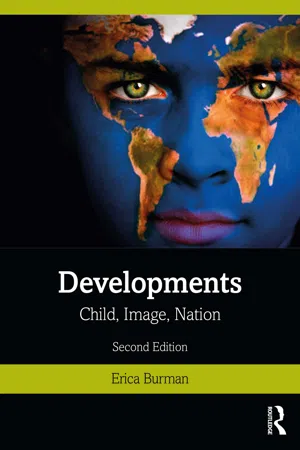
- 358 pages
- English
- ePUB (mobile friendly)
- Available on iOS & Android
About this book
How does developmental psychology connect with (what used to be called) the developing world? What do cultural representations indicate about the contemporary politics of childhood? How is concern about child sexual exploitation linked to wider securitization anxieties? In other words: what is the political economy of childhood, and how is this affectively organized? This new edition of Developments: Child, Image, Nation, fully updated, is a key conceptual intervention and resource, reflecting further on the contexts and frameworks that tie children to national and international agendas.
A companion volume to Burman's Deconstructing Developmental Psychology (third edition, 2017) this volume helps explain why questions around children and childhood, including their safety, welfare, their interests, abilities, sexualities and their violence, have so preoccupied the late twentieth and twenty-first centuries, showing how the frames for these concerns have extended beyond their Euro-US contexts of origination. In this completely revised edition, Burman explores changing debates and contexts, offering resources for interpreting continuities and shifts in the complex terrain connecting children and development. Through reflection on an increasingly globalised, marketised world, that prolongs previous colonial and gendered dynamics in new and even more insidious ways, Developments analyses the conceptual paradigms shaping how we think about and work with children, and recommends strategies for changing them. Drawing in particular on feminist and post-development literatures, as well as original and detailed engagement with social theory, it illustrates how and why reconceptualising notions of individual and human development, including those informing models of children's rights and interests, is needed to foster more just and equitable forms of professional practice with children and their families.
Burman offers an important contribution to a set of urgent debates engaging theory and method, policy and practice across all the disciplines that work with, or lay claim to, children's interests. A persuasive set of arguments about childhood, culture and professional practice, Developments is an invaluable resource to teachers and students in psychology, childhood studies, and education as well as researchers in gender studies.
Tools to learn more effectively

Saving Books

Keyword Search

Annotating Text

Listen to it instead
Information
Table of contents
- Cover
- Half Title
- Title Page
- Copyright Page
- Table of Contents
- Acknowledgements to the first edition
- Acknowledgements to the second edition
- Introduction
- Part I Child: children and development: what is at stake?
- Part II Developing images
- Part III International development
- Part IV What follows postdevelopment?
- Part V Transnational dynamics
- References
- Index
Frequently asked questions
- Essential is ideal for learners and professionals who enjoy exploring a wide range of subjects. Access the Essential Library with 800,000+ trusted titles and best-sellers across business, personal growth, and the humanities. Includes unlimited reading time and Standard Read Aloud voice.
- Complete: Perfect for advanced learners and researchers needing full, unrestricted access. Unlock 1.4M+ books across hundreds of subjects, including academic and specialized titles. The Complete Plan also includes advanced features like Premium Read Aloud and Research Assistant.
Please note we cannot support devices running on iOS 13 and Android 7 or earlier. Learn more about using the app